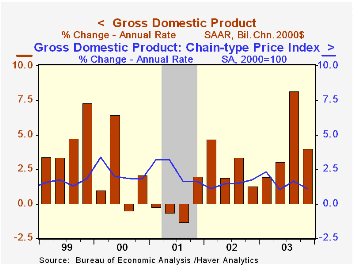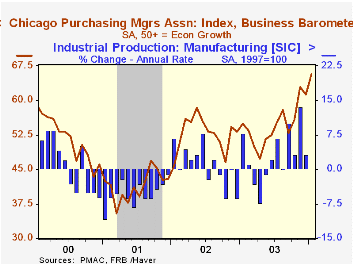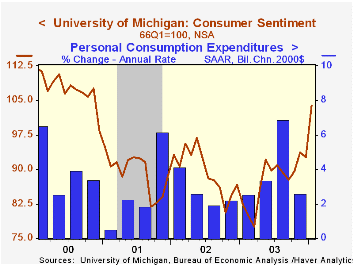 Global| Jan 30 2004
Global| Jan 30 20044Q U.S. GDP Light at 4.0%
by:Tom Moeller
|in:Economy in Brief
Summary
US economic growth last quarter of 4.0% (AR) was somewhat below Consensus expectations for 4.8%. The gain was half the 8.2% of 3Q but it raised growth for the full year to 3.1%, the fastest since 2000. Much of the disappointment in 4Q [...]

US economic growth last quarter of 4.0% (AR) was somewhat below Consensus expectations for 4.8%. The gain was half the 8.2% of 3Q but it raised growth for the full year to 3.1%, the fastest since 2000.
Much of the disappointment in 4Q growth stemmed from the foreign trade sector which added just 0.2 percentage points. Higher exports contributed 1.7 percentage points to GDP growth with a 19.1% (AR) q/q rise, but imports also surged by 11.3%.
Domestic final demand growth dropped to 3.1% from 7.2% in 3Q. Growth in real PCE slowed to 2.6% from 6.9% as spending on motor vehicles fell. Spending in other areas remained firm.
Nonresidential fixed investment surged another 9.0% (6.9% y/y) following two strong quarterly gains. Investment in equipment & software surged at an 11.5% rate following a 19.1% 3Q boom.
Residential investment surged at a 17.4% rate (15.0% y/y) after a 25.5% 3Q jump.
Inflation was tame at 1.1%. The PCE chain price index rose just 0.6% (AR, 1.4% y/y) as prices for consumer durables fell yet again (-4.0% y/y).
Analysis titled "Mind the Gap: Measuring Actual vs. Potential Output" from the Federal Reserve Bank of St. Louis is available here.
| Chained 2000$, % AR | 4Q '03 | 3Q'03 | Y/Y | 2003 | 2002 | 2001 |
|---|---|---|---|---|---|---|
| GDP | 4.0% | 8.2% | 4.3% | 3.1% | 2.2% | 0.5% |
| Inventory Effect | 0.6% | -0.1% | -0.1% | -0.1% | 0.4% | -0.9% |
| Final Sales | 3.4% | 8.3% | 4.4% | 3.2% | 1.8% | 1.4% |
| Trade Effect | 0.2% | 0.8% | 0.3% | -0.1% | -0.6% | -0.2% |
| Domestic Final Demand | 3.1% | 7.2% | 4.1% | 3.3% | 2.4% | 1.6% |
| Chained GDP Price Index | 1.1% | 1.6% | 1.5% | 1.6% | 1.5% | 2.4% |
by Tom Moeller January 30, 2004

The Chicago Purchasing Managers Business Barometer for January surged to 65.9 versus 61.2 in December. That was the highest level since July 1994 and was versus Consensus expectations for a modest rise to 62.0. Revisions were made to prior figures due to new seasonal factors.
During the last twenty years there has been a 52% correlation between the level of the Chicago PMI and quarterly growth in real GDP.
The new orders index jumped to 69.7, the highest level since July 1994. Production also jumped to 76.5 the highest level since January 1984.
Employment dipped below 50 for the third consecutive month to 48.3.
The index of prices paid jumped to 67.8 and recovered virtually all of the prior month's slide.
| Chicago Purchasing Managers Index, SA | Jan | Dec | Y/Y (1'02) | 2003 | 2002 | 2001 |
|---|---|---|---|---|---|---|
| Business Barometer | 65.9 | 61.2 | 54.9 | 54.7 | 52.7 | 41.4 |
| New Orders | 69.7 | 66.1 | 57.1 | 58.0 | 56.2 | 42.3 |
| Prices Paid | 67.8 | 57.3 | 56.1 | 55.8 | 56.9 | 50.4 |
by Tom Moeller January 30, 2004

The University of Michigan’s consumer sentiment index for the full month of January rose to 103.8, up 12.1% m/m. That was better than the 11.4% spike in sentiment reported mid-month and was better than Consensus expectations for a reading of 103.0.
During the last ten years there has been an 75% correlation between the level of consumer sentiment and the y/y change in real PCE. That correlation has risen to 84% during the last five years.
The current conditions index jumped 12.9% m/m to 109.5 and the expectations index added 11.5% m/m to 100.1. Both readings were improved versus mid-month.
The University of Michigan survey is not seasonally adjusted.It is based on telephone interviews with 250 households nationwide on personal finances and business and buying conditions. The survey is expanded to a total of 500 interviews at month end.
| University of Michigan | Jan | Dec | Y/Y | 2003 | 2002 | 2001 |
|---|---|---|---|---|---|---|
| Consumer Sentiment | 103.8 | 92.6 | 26.0% | 87.6 | 89.6 | 89.2 |
| Current Conditions | 109.5 | 97.0 | 12.7% | 97.2 | 97.5 | 100.1 |
| Consumer Expectations | 100.1 | 89.8 | 37.5% | 81.4 | 84.6 | 82.3 |
Tom Moeller
AuthorMore in Author Profile »Prior to joining Haver Analytics in 2000, Mr. Moeller worked as the Economist at Chancellor Capital Management from 1985 to 1999. There, he developed comprehensive economic forecasts and interpreted economic data for equity and fixed income portfolio managers. Also at Chancellor, Mr. Moeller worked as an equity analyst and was responsible for researching and rating companies in the economically sensitive automobile and housing industries for investment in Chancellor’s equity portfolio. Prior to joining Chancellor, Mr. Moeller was an Economist at Citibank from 1979 to 1984. He also analyzed pricing behavior in the metals industry for the Council on Wage and Price Stability in Washington, D.C. In 1999, Mr. Moeller received the award for most accurate forecast from the Forecasters' Club of New York. From 1990 to 1992 he was President of the New York Association for Business Economists. Mr. Moeller earned an M.B.A. in Finance from Fordham University, where he graduated in 1987. He holds a Bachelor of Arts in Economics from George Washington University.
More Economy in Brief
 Global| Feb 05 2026
Global| Feb 05 2026Charts of the Week: Balanced Policy, Resilient Data and AI Narratives
by:Andrew Cates






